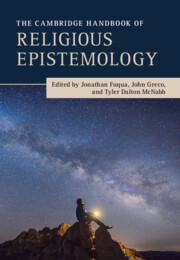Book contents
- The Cambridge Handbook of Religious Epistemology
- Cambridge Handbooks in Philosophy
- The Cambridge Handbook of Religious Epistemology
- Copyright page
- Contents
- Tables
- Contributors
- Introduction
- Part I Faith and Rationality
- Part II Religious Traditions
- 8 Jewish Religious Epistemology
- 9 Christian Religious Epistemology
- 10 Islamic Religious Epistemology
- 11 Hindu Religious Epistemology
- 12 Buddhist Religious Epistemology
- Part III New Directions
- References
- Index
9 - Christian Religious Epistemology
from Part II - Religious Traditions
Published online by Cambridge University Press: 24 August 2023
- The Cambridge Handbook of Religious Epistemology
- Cambridge Handbooks in Philosophy
- The Cambridge Handbook of Religious Epistemology
- Copyright page
- Contents
- Tables
- Contributors
- Introduction
- Part I Faith and Rationality
- Part II Religious Traditions
- 8 Jewish Religious Epistemology
- 9 Christian Religious Epistemology
- 10 Islamic Religious Epistemology
- 11 Hindu Religious Epistemology
- 12 Buddhist Religious Epistemology
- Part III New Directions
- References
- Index
Summary
This chapter highlights an important but neglected type of evidence for Christianity: the content of the Christian revelatory claim. This content consists, at its core, of scriptures and definitive statements of doctrine; these are structured, vivified, and interpreted through various media. Though evidence of this sort is neglected by natural theologians, it has substantial evidential value in the minds of ordinary believers, underwriting both God’s existence and Christianity itself. The chapter offers beginning defenses of three theses: (1) The content of a revelatory claim may provide evidence enabling an inquirer to assent simultaneously to the revelatory claim and the embedded proposition that God exists; (2) Aquinas’s systematic unfolding of Christian revelatory content can enhance the plausibility, both for agnostic inquirers and for believers, of the claim the content was revealed; and (3) An argument from revelatory content can reasonably persuade agnostic inquirers that assent to theism and Christianity is personally obligatory.
Keywords
- Type
- Chapter
- Information
- The Cambridge Handbook of Religious Epistemology , pp. 132 - 147Publisher: Cambridge University PressPrint publication year: 2023

